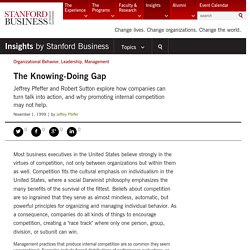

The Knowing Doing Gap. Eight guidelines for closing the knowing-doing gap. Small batch software development is good There are many advantages to working in small batches in software development:Faster feedbackProblems are localisedReduced riskGreater pressure and practice to reduce overheadSee The Principles of Product Development Flow for more Naive small batch software development is not quite so good There is also a significant disadvantage when small batches are done naively: disconnection from overall purpose.

In my head I see a tree where the trunk is built from the goals or desired benefits that drive the system; big branches are users; the small branches and twigs are the capabilities they need; then finally the leaves are the user stories small enough to place into development iterations. After all that work, after establishing all that shared understanding I feel like we pull all the leaves off the tree and load them into a leaf bag - then cut down the tree. Instead, a more effective approach goes beyond work broken down into smaller pieces. Stanford Graduate School of Business.
Most business executives in the United States believe strongly in the virtues of competition, not only between organizations but within them as well.

Competition fits the cultural emphasis on individualism in the United States, where a social Darwinist philosophy emphasizes the many benefits of the survival of the fittest. Beliefs about competition are so ingrained that they serve as almost mindless, automatic, but powerful principles for organizing and managing individual behavior. As a consequence, companies do all kinds of things to encourage competition, creating a "race track" where only one person, group, division, or subunit can win.
Management practices that produce internal competition are so common they seem unexceptional. There is no doubt that zero-sum games can inspire people to work hard, and that the individual winners of these internal competitions benefit from their victories. This is why quality guru W. Interdependence is another important way that tasks differ. The Knowing Doing Gap - How Smart Companies Turn Knowledge Into Action. Why Can't We Get Anything Done? These days, people know a lot.

Thousands of business books are published around the world each year. U.S. organizations alone spend more than $60 billion a year on training — mostly on management training. Companies spend billions of dollars a year on consulting. Meanwhile, more than 80,000 MBAs graduate each year from U.S. business schools. These students presumably have been taught the skills that they need to improve the way that companies do business. But all of that state-of-the-art knowledge leaves us with a nagging question: Why can't we get anything done? To answer that question, Fast Company talked to Jeffrey Pfeffer, 53, the Thomas D. 1. One culpable party is the literature of knowledge management — almost the cult of knowledge management — that has grown over the past few years.
The reason that we've fallen into this knowing-doing gap is this: Doing something actually requires doing something! 2. Today, there are experts on everything except how to get things done. 3.